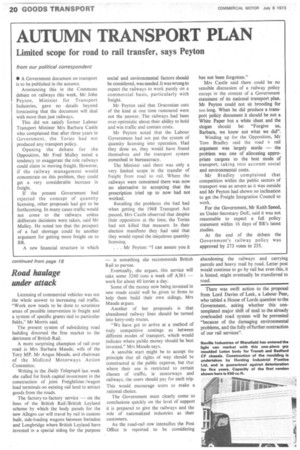AUTUMN TRANSPORT PLAN
Page 22

If you've noticed an error in this article please click here to report it so we can fix it.
Limited scope for road to rail transfer, says Peyton
from our political correspondent • A Government document on transport is to be published in the autumn.
Announcing this in the Commons debate on railways this week, Mr John Peyton. Minister for Transport Industries, gave no details beyond forecasting that the document will deal with more than just railways.
This did not satisfy former Labour Transport Minister Mrs Barbara Castle who complained that after three years in Government, the Tories had not produced any transport policy.
Opening the debate for the Opposition, Mr Fred Mulley noted a tendency to exaggerate the role railways could claim in moving freight. However, if the railway management would concentrate on this problem, they could get a very considerable increase in freight.
If the present Government had rejected the concept of quantity licensing, other proposals had got to be forthcoming. In many cases traffic would not come to the railways unless deliberate decisions were taken, said Mr Mulley. He noted too that the prospect of a fuel shortage could be another argument for getting more freight on to BR.
A new financial structure in which social and environmental factors should be considered, was needed. It was wrong to expect the railways to work purely on a commercial basis, particularly with freight.
Mr Peyton said that Draconian cuts of the kind at one time rumoured were not the answer. •The railways had been over-optimistic about their ability to hold and win traffic and contain costs.
Mr Peyton noted that the Labour Government had not put the system of quantity licensing into operation. Had they done so, they would have found themselves and the transport system enmeshed in bureaucracy.
The Minister said there was only a very limited scope in the transfer of freight from road to rail. Where the railways were concerned there was now no alternative to accepting that the prescription tried up to now had not worked.
Recalling the problems she had had when getting the 1968 Transport Act passed, Mrs Castle observed that despite their opposition at the time. the Tories had not killed that measure. In their election manifesto they had said that they would repeal the iniquitous quantity licensing.
. . Mr Peyton: "I can assure you it has not been forgotten."
Mrs Castle said there could be no sensible discussion of a railway policy except in the context of a Government statement of its national transport plan. Mr Peyton could not sit brooding for too long, When he did produce a transport policy document it should be not a White Paper but a white sheet and the slogan should be: "Forgive us, Barbara, we knew not what we did".
Winding up for the Opposition, Mr Tom Bradley said the road v rail argument was largely sterile — the problem was one of allocating appropriate cargoes to the best mode of transport, taking into account social and environmental costs.
Mr Bradley complained that competition within the public sectors of transport was as severe as it was outside and Mr Peyton had shown no inclination to get the Freight Integration Council to work.
For the Government, Mr Keith Speed, an Under-Secretary DoE, said it was not reasonable to expect a full policy statement within 16 days of BR's latest studies.
At the end of the debate the Government's railway policy was approved by 273 votes to 255.




























































































































































